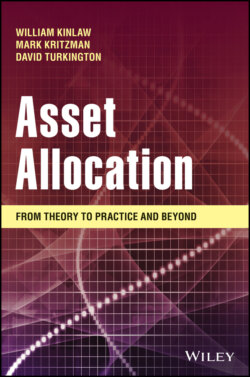Читать книгу Asset Allocation - William Kinlaw, Mark P. Kritzman - Страница 10
Foreword to the First Edition
ОглавлениеA Practitioner’s Guide to Asset Allocation by William Kinlaw, Mark Kritzman, and David Turkington speaks to the “forgotten man” of our field: he or she who interacts with the client and delivers professional investment advice. They are the foot soldiers of our field. Our field has an abundance of articles by academics trying to persuade other academics as to how practitioners should advise clients; articles written by academics for “quantitative” practitioners, who are actually academics, usually employed by large institutional investors, either as window dressing, or to build systems to replace “nonquantitative” academics; textbooks trying to educate students as to how they too can write academic articles – enough of them to achieve tenure – on how practitioners should practice; and, now and then, books written by academics for practitioners on “what every academic knows and I'll try to explain to you.” But there are remarkably few well-written books or articles, by learned scholars, for practitioners, without calculus, on controversial topics of practical importance, on which the scholar has published strong views.
The Kinlaw, Kritzman, and Turkington “Guide” fills this void. Specifically, among its 16 chapters for practitioners (plus an “Addendum” with chapters on statistical concepts and a glossary of terms) is a discussion of why it is not true that the Markowitz optimization procedure maximizes rather than minimizes risk for given return, and why the investment practitioner's clients would not be better served by the practitioner recommending an equal weighted portfolio rather than going through the demanding modern portfolio theory (MPT) process.
This guide should be of interest to practitioners; scholars who seek to develop or evaluate techniques that can be of practical value in practitioners' hands; academics who would like to create, explore, or evaluate, empirically or theoretically, relationships that can guide the development of such techniques; investors (especially institutional investors) who must evaluate alternative current or potential advisors; and broadly read non-finance readers who enjoy a good intellectual fight.
Harry Markowitz, Nobel Prize Recipient, 1990, Economic Sciences; President, Harry Markowitz Company
